- Home
- Cynthia Hand
The Last Time We Say Goodbye Page 17
The Last Time We Say Goodbye Read online
Page 17
SOMEHOW, I’M NOT EVEN SURE EXACTLY HOW, I get through the rest of the day. I ride home. I make my way silently up the driveway and into my house. I take off my shoes and coat and set my backpack by the door. I pad down the hall into Mom’s bedroom, through the room, into her bathroom. I open her bathroom cabinet and take down her bottle of prescription Valium.
If this were Brave New World, I’d take the stupid soma.
I wonder if Mom knows yet. My heart squeezes at the thought. For a minute I’m struck with a childlike desire to have her hold me and stroke my hair and tell me everything will be all right. I’m upset, and I want my mother to comfort me. That’s what mothers do. But with this news about Patrick, I suspect it’s going to be the other way around.
She’s going to need me.
I need to keep it together.
“We must learn to deal with the facts,” I whisper. I look at the single bright pill in my hand for a minute, and then I put it in my mouth and lean over the faucet to swallow it down.
I go to my room and curl up on my bed.
0.
1.
1.
2.
3.
5.
8.
13.
21.
34.
55.
89.
144.
233.
377.
610.
987.
1,597.
2,584.
4,181.
6,765.
10,946.
17,711.
28,657.
46,368.
75,025.
121,393.
196,418.
317,811.
514,229.
832,040.
1,346,269.
2,178,309.
3,524,578.
5,702,887.
9,227,465.
14,930,352.
24,157,817.
39,088,169.
My head goes fuzzy. I imagine the Valium doing its work inside me, binding to the receptors in my brain. I can feel myself sliding, sliding, off to the gray space. To sleep.
I don’t dream about anything at all.
11 March
Here’s my last real memory of Patrick Murphy: the day I caught Ty and his friends smoking in the playhouse.
They were 12.
Oh, yeah. They were busted big time.
Building stuff was one of Dad’s temporary hobbies when I was about 9. It started when he decided to construct a custom doghouse for our dog, Sunny. He spent about two weeks on it in careful construction, nailing and sanding and laying real roof tiles on the top to keep the weather out. He even painted it to match our house: green, with white trim.
Sunny hated it. She much preferred the family-room sofa.
It didn’t matter. Dad was so pleased with how the doghouse turned out that he decided to try his hand at something bigger. A playhouse. He went to Toys “R” Us to study the pictures of the thousand-dollar playhouses they sold and came home with a solemn promise to Ty and me that he would build us the best playhouse this side of the Mississippi—not some roughshod half-plastic monstrosity that would only look good for a summer or two, he said. Something solid.
Something that would last.
He enlisted the help of Aunt Jessica, who’s an architect in Missouri. She drew up the blueprints for a 500-square-foot, one-and-a-half-story playhouse, which was basically a square little room with a ladder and a loft.
Dad bought the materials. He laid a set of pretreated railroad ties as the foundation for the structure, in case we ever sold our house and wanted to move the playhouse, he said. He dug a 30-foot-long trench between the house and the far corner of the backyard, so he could run electricity to our playhouse. So we could have lights.
It was a big freaking deal.
Dad built the frame first, then the roof. He put real insulation in the walls, to keep it warm in the winter and cool in summer. Ty and I wrote our names on the inside of one wall before Dad sealed it up with drywall and painted. He installed real glass windows that opened and closed, complete with screens to keep the bugs out, and a real full-sized front door with a little window in it. Then he set down a layer of cheap black-and-white-checkered linoleum on the main floor, and green carpet in the loft. The outside he painted to match our house, too. Green with white trim. Topped off with a tiny front porch with a porch light and everything.
Mom sewed some curtains for the windows. She bought a large play kitchen set from a garage sale in Lincoln: a toy refrigerator, stove, and sink, with storage where I could keep my food play dough molds, my plastic dishes and cups, and my tea set. She even splurged on a child-sized wooden table and chairs.
Suddenly all the neighborhood kids wanted to come to our house to play.
Sadie and I practically lived in the playhouse from ages 9 to 12, our sleeping bags always ready to roll out in the loft. The green carpet became grass for our My Little Ponies and Barbie’s front lawn, and the light blue walls were the sky, and we stuck glow-in-the-dark stars to the sloped ceiling.
It was our own private world.
I feel I must guiltily confess that it wasn’t Ty’s own private world, not until Sadie and I lost interest, which took a few years. Then, after dollies and Barbies and playing at being grown-ups lost their sparkle, the playhouse passed to Ty.
So. That time with Patrick. Mom sent me out to the playhouse to bring Ty, Damian, and Patrick in for dinner. I knew there was something going down the minute I came through the door and heard all this scrambling up in the loft.
I smelled the cigarettes right away. I mean, they hadn’t even opened the windows.
“Hey, you guys,” I said cheerfully. “What are you doing?”
I climbed halfway up the ladder and stuck my head into the loft. The boys all looked at me with wide, innocent eyes.
“Nothing,” Ty said. He gestured to Dad’s old boom box, which was playing “Stairway to Heaven.” “We’re just chilling.”
I looked at Damian and Patrick. Damian looked the same as he does now: thin and birdlike, his clothes hanging off him in various shades of muted colors, gray eyes wary like any second he expected somebody to attack him. Patrick was one of those kids who had orange hair like a sweet potato and white, white skin with freckles all over. His face was bright red.
“Are you okay, Patrick?” I asked.
He started coughing. The minute he opened his mouth a puff of cigarette smoke came out. He coughed and coughed and coughed.
I looked down for a minute. “Hmm,” I said. Sigh. “Okay, boys. Hand them over.”
Ty’s face was a little green. He started to say, “Hand what over?” but I gave him a look that said he didn’t want to mess with me. Ty brought his hands out from behind his back and produced their hastily stubbed-out cigarettes. They’d put them out on a piece of my porcelain tea set, the thoughtful little sweethearts.
At least it’s not pot, I thought. I stared at the plate, then rolled my eyes. “Where’s the rest?”
“The rest?” squeaked Damian.
“The pack. Where is it?”
They exchanged glances and then decided there was no getting past me. Ty opened up the My Little Pony Dream Castle, where he’d stuffed the pack of Virginia Slims.
I choked back a laugh. “Where did you get these?”
Silence.
“Tell me or I tell the grown-ups.”
“I swiped them from my mom’s purse,” Damian confessed.
I rubbed my eyes. Sighed again. “You guys. Wow.”
“Please don’t tell,” pleaded Patrick, almost in tears. “My dad would be so mad.”
“You know why he would be mad?” I asked. “Because only morons smoke cigarettes.” I looked at Damian. “Sorry, Damian, but your mom’s a moron.”
He didn’t argue.
I held up the Virginia Slims pack. “These kill you. It’s slow so you don’t really notice, but they will kill you. They also make your
breath smell bad and turn your teeth yellow and wreck your voice and stain your fingers and empty your wallet and about a hundred other terrible things.”
“We were trying it out once,” Ty said. “We weren’t going to start smoking or anything.”
“The girls at school think it’s cool,” Patrick said defensively.
“Right. The girls in your middle school. Whose center of the universe right now is the fricking Rainbow Loom. I’ll tell you what, I would never, ever kiss a guy who smoked. Uck.” Not that I would ever kiss a guy period, I thought wistfully. This was a few months before the infamous Nathan Thaddeus Dillinger II.
Damian and Patrick looked thoughtful.
“So are you going to tell Mom?” Ty asked.
I thought about it for like 2 seconds. “No. But only if you guys promise me you’ll never do something this moronic again.”
“We promise,” they said immediately.
I made them pinky swear. The most solemn oath.
“Lexie?” Mom yelled from the back porch. “Boys?”
I turned to the 3 amigos. “Here’s what you’re going to do. You’re going to go straight into the house and say I told you to wash your disgusting boy hands. Which you will do. Then we have to do something about your breath.”
“We could use Dad’s mouthwash,” Ty suggested.
“Too obvious. I’ll bring by a box of Tic Tacs while you’re in there. You’ll come out and have dinner, yum yum yum, and then Damian, you’re going to go home and tell your mom you stole her cigarettes, and give them back.”
Damian’s face went pale. “What?”
“You’re going to tell her you stole her cigarettes because cigarettes kill people, and you don’t want her to die. She’ll forgive you if you put it like that. Okay? Got it? Do we understand the plan?”
3 nods.
I marched them down the ladder and out of the playhouse.
“You have like the best sister ever,” I heard Patrick say to Ty as we crossed the yard.
“She’s all right.”
And that’s the last thing I remember about Patrick. Saying I was the best sister.
Wishing that he had a big sister like me.
22.
MOM IS MAKING A GREEN BEAN CASSEROLE.
Her hands tremble slightly as she trims the beans with a sharp knife, but she doesn’t cut herself. She scoops the beans up and delivers them into a pot of rapidly boiling water. She waits until they’re tender but still slightly crunchy. She drains them over a sieve in the kitchen sink. The steam fogs her glasses. Then she leaves them hot in the sink to open a can of cream of mushroom soup, which she whips together with a cup of milk, a quarter cup of french fried onions, a dash of salt, an eighth of a teaspoon of pepper, and a tablespoon of melted butter. She pours the frothy mix into a glass baking dish. She adds the green beans, stirs them gently, then covers the dish with foil. She puts the dish in the oven. She sets the timer.
We wait.
Outside, a single chickadee is perched on a branch near the kitchen window, chirping. Clouds are moving across the sky. Snow is falling in slow motion.
The timer goes off. Mom dons a pair of mitts, reaches into the heat of the oven, and draws out the dish. She sets it on a hot pad on the counter and carefully rearranges another layer of french fried onions around the edges.
I’m reminded of Christmas. Mom used to make green bean casserole at Christmas. She was never a top chef or anything, but it was a good casserole. I would watch her, just this way, as she put it together.
This was the part where my hand would snake out and steal some onions.
This was the part where, if she caught me, Mom would smack me on the wrist with her wooden spoon. Then she’d take a handful of onions for herself, and she’d smile, and I’d smile, and we’d eat them like it was some kind of marvelous secret between us. They were salty and left a layer of grease on my tongue, and I loved them.
There was no green bean casserole this Christmas. For obvious reasons. We ate pity food for Christmas this year.
Mom finishes dispensing the onions and returns the dish to the oven, uncovered this time. She resets the timer.
We wait.
The timer rings again. Mom gets the mitts and takes the casserole out. The onions on top have baked to a lovely golden brown. The air smells savory and rich. She puts the dish on the counter to cool.
At the sink Mom scrubs her hands in a way that reminds me of a surgeon prepping. She dries her hands and removes her apron to reveal her simple black sheath dress. She smooths the fabric down her sides and pads off on bare feet with unpainted toes to retrieve her shoes, a pair of plain black pumps. She gracelessly leans against the table to slip them on one foot at a time. Then she goes to the counter and measures out a new layer of foil for the casserole. She takes a black marker out of a drawer and writes From Joan and Alexis Riggs across the top. She folds it over the casserole. She puts the dish into an insulated bag that will keep it warm.
Then she picks up her purse and checks its contents—lipstick, powder, a card for the Murphys, which she had me sign earlier.
It says, With sorrow for your loss.
We have become the observers of tragedy.
Mom checks her watch. She palms her car keys. Then she looks at me.
“Are you ready?” she asks.
I nod.
She brushes off the shoulders of my black cable-knit sweater.
“All right,” she says, her voice as flat as if we were making a trip to the dentist. “Let’s go.”
Patrick’s funeral is held in the Cathedral of the Risen Christ, a different church than where we held Ty’s funeral. Practically the entire school turns up, even the teachers and the principal and the office staff. Mom and I sit in the back of the sanctuary, and try to ignore the way people are looking at us, two ways, actually: (a) They know that this funeral is going to be particularly hard for us, and they feel sorry for that, but they need to focus on the Murphys now, please understand. Which we do. And (b) we shouldn’t be here. Our kid infected this kid with the suicide disease. We should feel ashamed of this. Which we also kind of do.
Maybe they’re right. Maybe we shouldn’t have come, but Mom wants to be here, if only to lend silent support, if only to prove to the Murphys that survival is possible.
So we sit in the back.
There’s no viewing this time. Closed casket. Because it was death by train.
Patrick’s casket is white and shiny and edged with silver, like the hood of an expensive car. On top is a heap of red roses that I can smell from here. One rose by itself smells nice, but twenty-four of them fill the room with such a cloying sweetness that it overwhelms everything else. It makes my stomach turn.
Still, there are worse things to smell than roses.
At the foot of the casket Patrick’s dad stands next to a giant framed photograph of a younger, happier version of Patrick. His dad greets the people who line up to pay their respects, like some kind of twisted wedding reception in reverse. With the men he shakes hands, but it’s not so much a shaking motion as them grabbing his hand and holding it for a few seconds, then letting go. The women give him awkward, tearful hugs.
I can’t hear what they’re saying, but I know that it’s variants of “I’m sorry,” and “Patrick was a good person/kid/student/human being/member of the swim team,” and “Call us if you need anything,” and Patrick’s father is saying, “Thank you,” and “I know,” and “I will.”
Even though he probably won’t.
Patrick’s mother died when he was a kid. Car accident. So they’ve been through this before. He has a younger sister, but she’s not standing with her dad. I locate her, already seated in the front pew. Her head is down, and I wonder if she’s reading the program or praying or staring at her toes.
I stared at my toes, when it was me sitting at the front of the church.
The organist starts to play. People file into the pews and stand, singing.
Mom hands me
the program. On the front is a smaller black-and-white picture of Patrick, smiling his awkward smile, and a Bible verse, Romans 8:38–39: For I am convinced that neither death nor life, neither angels nor demons, neither the present nor the future, nor any powers, neither height nor depth, nor anything else in all creation, will be able to separate us from the love of God that is in Christ Jesus our Lord.
Ty had the same scripture. It must be the go-to Bible passage for suicides.
The song fades away. Patrick’s dad joins the sister in the front row. The priest in his black robes climbs the steps to the podium.
“Good afternoon,” the priest says. “We are gathered here today to celebrate the life and mourn the passing of Patrick Michael Murphy.”
I don’t remember much of Ty’s funeral. What struck me about the funeral was that it ultimately felt like some kind of trial. Ty had committed a crime—premeditated murder, if you want to be technical—and we were all assembled there, his family and friends, his teachers and fellow students, as witnesses to testify to his good character.
Everyone who got up to speak said an approximation of the same thing:
Ty was kind—we never heard him say a cruel word to anyone.
He worked hard in his classes, even if he wasn’t the best student.
He had some killer basketball moves, even if he wasn’t very tall.
He was a good dancer.
He was sensitive. He felt things deeply. “Maybe too deeply,” the pastor said, as if that explained everything.
Ty was good. Implication: He didn’t deserve to be punished for his crime. He wasn’t in his right mind. He wasn’t thinking clearly. He didn’t mean it.
Please, God, please, have mercy on his soul.
To which God responded: Neither death nor life, neither angels nor demons, neither the present nor the future, nor any powers, neither height nor depth, nor anything else in all creation, will be able to separate us from the love of God that is in Christ Jesus our Lord.
Then everyone was allowed to feel better about it.
When Mom got up to speak, she said she was grateful for the sixteen years she got to spend with Ty, wonderful years, she said. She thanked people: his piano teacher, his Boy Scout leader, his basketball coach, his favorite French teacher, etc., for making those years so wonderful. Her voice quavered, but she didn’t cry.

 Boundless
Boundless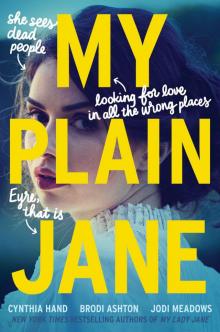 My Plain Jane
My Plain Jane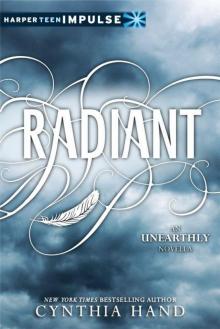 Radiant
Radiant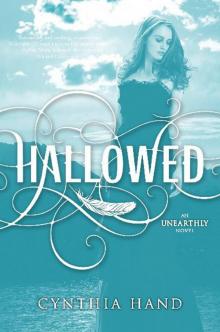 Hallowed
Hallowed 01 Unearthly
01 Unearthly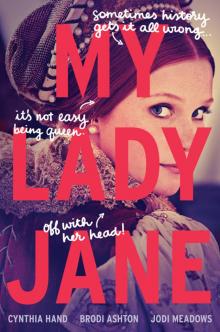 My Lady Jane
My Lady Jane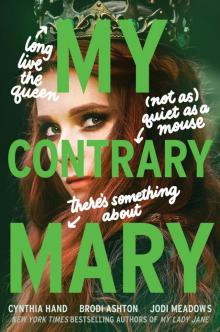 My Contrary Mary
My Contrary Mary Unearthly
Unearthly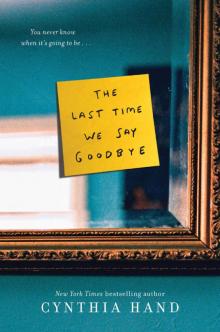 The Last Time We Say Goodbye
The Last Time We Say Goodbye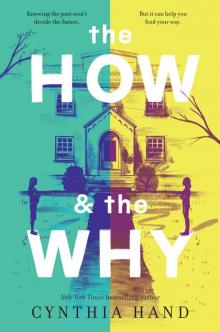 The How & the Why
The How & the Why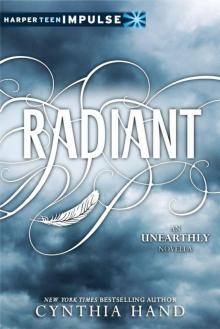 Radiant (HarperTeen Impulse)
Radiant (HarperTeen Impulse)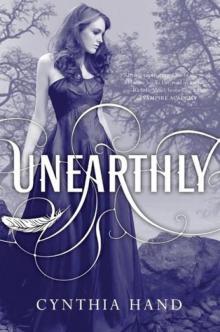 Unearthly u-1
Unearthly u-1 Boundless (Unearthly)
Boundless (Unearthly)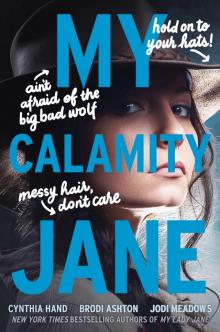 My Calamity Jane
My Calamity Jane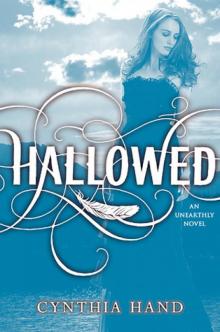 Hallowed u-2
Hallowed u-2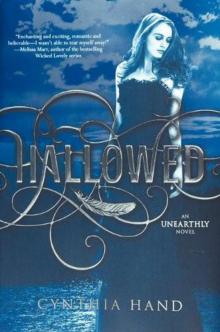 Hallowed: An Unearthly Novel
Hallowed: An Unearthly Novel